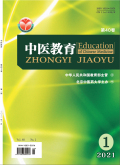中医教育2024,Vol.43Issue(3):13-20,8.DOI:10.3969/j.issn.1003-305X.2024.03.565
导师支持对中医硕士专业学位研究生临床科研能力的影响
The impact of supervisor support on the clinical research capabilities of traditional Chinese medicine professional master's students
摘要
Abstract
Objective To investigate and analyze the impact of supervisor support on the clinical research capabilities of traditional Chinese medicine profesional master's students and the role of different motivations and research self-efficacy in this process.Methods A questionnaire survey was conducted from April 14th to 20th,2023 using convenience sampling among traditional Chinese medicine professional master's students at 8 standardized training bases for traditional Chinese medicine in Beijing.Participants filled out the Supervisor Support Scale,Motivation Scale,Research Self-efficacy Scale,and Clinical Research Ability Self-evaluation Scale.Partial least squares-structural equation model was used to analyze the data.Results The survey yielded 404 valid samples.Parameters of the structural equation model met the criterion,and the model direct path results showed that supervisor support positively predicted clinical research ability(β=0.349,P<0.01)and autonomous motivation(β=0.512,P<0.01),and negatively predicted controlled motivation(β=-0.338,P<0.05).Autonomous motivation positively predicted clinical research ability(β=0.187,P<0.05)and research efficacy(β=0.760,P<0.01),and negatively predicted controlled motivation(β=-0.479,P<0.01).Controlled motivation negatively predicted research efficacy(β=-0.134,P<0.05).Scientific research efficacy positively predicted clinical research ability(β=0.306,P<0.01).Bootstrap results showed that the direct effect accounted for 59.32%of the total effect.The indirect effect accounted for 40.68%of the total effect and was partially mediated through two chain mediating pathways:supervisor support→ autonomous motivation→ research efficacy→clinical research ability(accounted for 20.85%of the total effect)and supervisor support→ controlled motivation→ research efficacy→ clinical research ability(accounted for 2.2%of the total effect).Conclusion In the cultivation process of clinical research capabilities in traditional Chinese medicine master′s programs,supervisor support is an important external support force.For students themselves,a balance of yin and yang between autonomous and controlled motivation,as well as a higher level of scientific research efficiency,can improve training efficiency and fully leverage the effect of supervisor support.The training unit should not only attach importance to the improvement of the supervisor′s abilities and the transformation of guidance style,but also pay attention to the motivation and efficacy of students,and comprehensively enhance the supervisor′s guidance level in academic,autonomy,and interpersonal relationships through training and assessment.关键词
导师支持/自我决定理论/科研效能感/中医硕士专业学位研究生/结构方程模型Key words
supervisor support/self-determination theory/research self-efficacy/master′s degree in traditional Chinese medicine/structural equation modeling分类
社会科学引用本文复制引用
莫捷,赵琛,梁佳,李磊,程璠,解华,姜幼明,张立平..导师支持对中医硕士专业学位研究生临床科研能力的影响[J].中医教育,2024,43(3):13-20,8.基金项目
全国中医药研究生教育研究课题(No.YJS-YB-2023-20) (No.YJS-YB-2023-20)
北京中医药大学教师思想政治与师德师风工作研究课题(No.2023JSSZYB-06) (No.2023JSSZYB-06)
北京中医药大学教育科学研究课题(No.XJY22067) (No.XJY22067)

